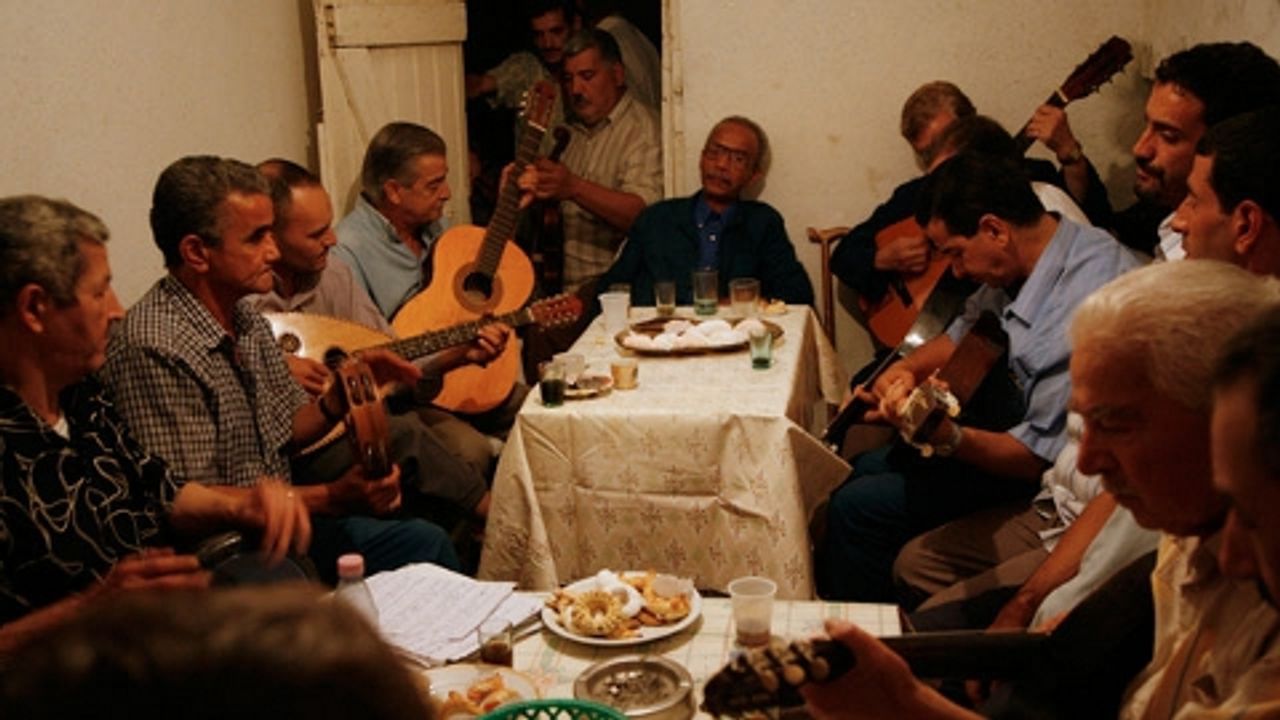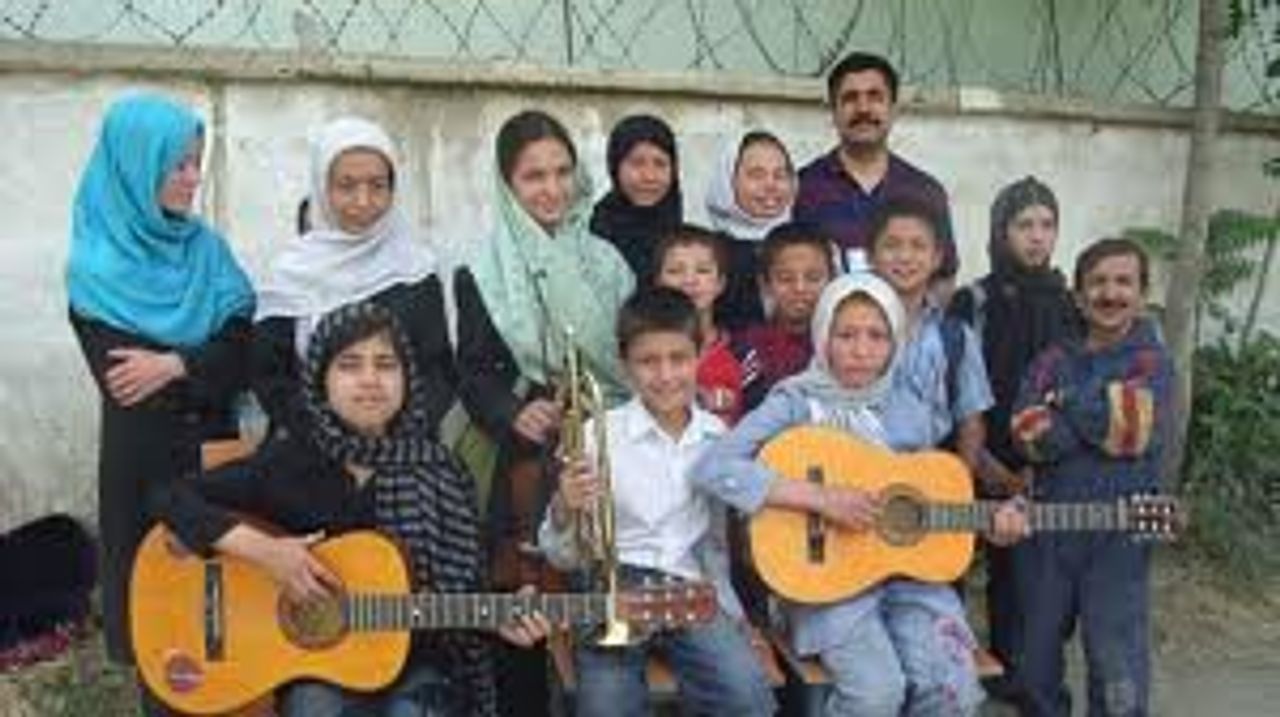This is the second in a series of articles on the recent Sydney Film Festival. See part 1.
Of the three music documentaries viewed by this writer at this year’s Sydney Film Festival, El Gusto was the most engaging. Written and directed by former architect Safinez Bousbia, the 89-minute documentary is about the demise and revival of chaabi, a little-known musical genre from the Casbah of Algiers, the Algerian capital.
Chaabi, as one musician explained, is “popular in the real sense of the word—it is music of the streets.” A combination of classical Andalusian melodies, religious chants and Berber songs, this intoxicating blend was played and enjoyed by Muslims, Christians and Jews alike in Algiers.
Previously denigrated as music of the “lower classes”, chaabi acquired status after its “father”, El Hadj M’Hamed El Anka, established a multi-faith orchestra in the 1930s and initiated the study of the musical form at the Conservatoire, where Muslims had been denied entry prior to 1947.
Aptly described as a “North African Buena Vista Social Club”, Bousbia’s documentary implicitly challenges false assertions that cultural differences between Muslims and Jews are unbridgeable. As El Gusto reveals, local Muslims used to attend the Casbah synagogue every Saturday just to listen to Hebrew music. One of the musicians interviewed also explains that prior to the 1946-1958 French military occupation there was harmony between all faiths and nationalities in the Casbah: “Spaniards, Jews, Christians, Arabs and Muslims all lived together.”
 El Gusto
El GustoBousbia decided to make El Gusto after visiting the Casbah in 2004. She discovered during a conversation with one of the shopkeepers—Mohamed Ferkioui—that he had been member of the celebrated chaabi orchestra during the 1950s. The orchestra, she learnt, was torn apart with the outbreak of the powerful Algerian independence struggle in 1954, one of the bloodiest anti-imperialist battles of the twentieth century. More than a million Algerians were killed and tens of thousands of innocent men, women and children tortured by the French military and its associated militia during the eight-year conflict against French colonial rule.
While the FLN (National Liberation Front) under Ben Bella took power in 1962, the war had plunged the economy into chaos from which it was difficult to recover. Factional in-fighting and continuing economic upheavals wracked the “left” nationalist administration and in 1965 Colonel Boumedienne seized power in a military coup. In an attempt maintain support from Muslims, the FLN administration had previously mandated Islamic religious teachings in public schools, a right-wing shift that continued under Boumedienne and subsequent regimes.
According to the musicians interviewed, the FLN often referred to those of European ethnicity by the derogatory term “pied noir” or “black foot”. After its victory, Jews were told to cease singing in Arabic, and many Jewish musicians and students at El Anka’s school in the Conservatorie were forced to flee to France. A million Europeans left Algeria after 1962.
FLN revolutionaries who were musicians disguised messages in songs. However, several Arabic musicians and former FLN members interviewed in El Gusto claimed that under FLN rule music was denied a professional status, forcing musicians to take jobs as carpenters, taxi drivers and café owners in order to live. Casbah cafés and bars were also banned from selling alcohol or playing music.
The musicians were, in the words of one, “like the king’s jesters”, called upon when necessary for weddings and parties and the like. After Algerian independence, homes in the Casbah were allowed to fall into disrepair, many residents moved away and the social harmony that had characterised relationships between all ethnic groups disappeared. Chaabi music, moreover, was no longer taught at the Conservatoire. The documentary shows something of the music school’s current dilapidated state.
Bousbia eventually tracked down 42 members of the last celebrated chaabi orchestra scattered throughout France and Algeria and nine months later reunited them as the El Gusto orchestra. After much reminiscing and rehearsals, the orchestra began public performances with sold-out shows in Marseilles, an international tour and an album.
Bousbia’s fascinating documentary—her first full-length feature—shows how nationalist politics, not some so-called inherent cultural antipathy, forced the breakup of the orchestra, and almost succeeded in destroying a vital part of Algerian musical culture. A small sample of this wonderful music can be watched on YouTube here and here.
An Afghan music school
Directed and written by Australian filmmaker Polly Watkins, Dr. Sarmast’s Music School is about a University of Melbourne musicologist and his efforts to re-open a Kabul music school shut down in 1992 by the Taliban.
Sarmast, who left Afghanistan 15 years ago after the Taliban imposed a total ban on music, aims to establish a national music school. He dreams of training and developing local composers and musicians who will be capable arranging and playing western classical and Afghan traditional music for an orchestra of Afghan musical instruments. He also hopes to make music education available for the most underprivileged layers of Afghan society—orphans and street kids.
 Dr. Sarmast’s Music School
Dr. Sarmast’s Music SchoolThese are clearly noble aims and the documentary highlights some of the difficulties Sarmast confronts: the pervasive illiteracy, inability of families to afford music lessons and instruments, residual reactionary social attitudes to music and the dearth of basic resources, including specialist teachers. The National Institute of Music is established, however, in 2009 with a developed syllabus and teachers from abroad.
Watkin’s documentary is a limited, one-sided effort and entirely uncritical of the bloody US-led occupation of Afghanistan. In fact, the occupation is barely even mentioned. Watkins fails to make the obvious point that those agencies supporting Sarmast—the US embassy, the World Bank and the Goethe Institute—are assisting the musicologist in order to politically whitewash the bloody and ongoing imperialist occupation.
Perhaps the most revealing moment in Watkin’s documentary—and one presented without a hint of irony or criticism—is when US ambassador to Afghanistan Ryan Crocker visits the institute. After watching a performance by the students, he declares: “We invest a lot in this country. I can’t think of a better investment.”
Notwithstanding the aspirations of its principal protagonist, Dr Sarmast’s Music School sanitises the US-led occupation and will be used for this purpose on television networks and various film festivals.
A lengthy and often confused exposure
Running for three hours and twenty minutes, Jai Bhim Comrade (or “Long live Bhim Comrade”), directed by Anand Patwardhan, uses documentary footage, interviews and musical performance to explore the impact of India’s caste system on the Dalits. Along with the Adivasis, the Dalit are members of the so-called “untouchable” caste and subjected to ongoing official political and social discrimination.
Indian-born Patwardhan has been making documentaries about his country for the last thirty years, exploring themes such as nuclear war, political corruption, religious fundamentalism and the plight of slum dwellers (see: “The danger of war on the Indian Subcontinent”). Jai Bhim Comrade is the only film of the veteran filmmaker’s documentary features that has not brought him into conflict with Indian censors.
 Jai Bhim Comrade
Jai Bhim ComradePatwardhan began his latest movie 14 years ago, following the suicide of his friend Vilas Ghojre, a Dalit poet and songwriter in 1997. Ghojre hanged himself after 11 Dalits were shot and killed by police during a demonstration. They were protesting against the desecration of a statue of Bhimrao Ambedkar or “Bhim” who fought for the emancipation of the “untouchables”. Not a single police officer or official has been prosecuted for the shootings.
Songs composed by Ghojre and folk music combined with new words are interspersed throughout the documentary, highlighting the performance culture of the Dalits and how music has been a medium for resistance against oppression. Kabir Kala Manch (KKM), a Dalit musical troupe, is also featured. Indian authorities claim KKM it is a Maoist subversive group and have imprisoned two of its members. Others remain underground due to police threats.
Jai Bhim Comrade’s strength is its exposure of the brutal and unrelenting oppression of the Dalits, growing social inequality in India and the rise of Hindu fundamentalism. While Patwardhan is clearly on the side of the poor and the plight of the Dalits is keenly felt, his documentary is uncritical of Bhimrao Ambedkar’s politics and the various competing Dalit factions, past and present.
Ambedkar (1891-1956), a Dalit, fought for the emancipation of the “untouchables” and helped draft India’s constitution in 1950 which supposedly guaranteed secularism and equal rights to all Indian citizens. Maintaining that Hinduism was the basis of caste antagonisms, Ambedkar became a Buddhist in 1956. He claimed that meditation cultivated a higher state of mind and would enable people to take control of their lives and to help others. Following his example, millions of Indians converted.
A substantial portion of the film juxtaposes those who follow Ambedkar’s Buddhist principles with the pseudo-Marxist rhetoric of the so-called Dalit communists. It also highlights some of the sordid political alliances between various Dalit factions and “left” and right-wing Indian bourgeois parties.
Six decades since so-called Indian independence, the overwhelming majority of Dalits remain in dire poverty while a small, petty-bourgeois layer zealously promotes caste identity and therefore the profit system. The music featured is Jai Bhim Comrade is certainly interesting but Patwardhan’s approach, and his acceptance of Dalit “identity” politics only adds to the confusion. (For more on caste politics see: “India to conduct caste census”)
To be continued
